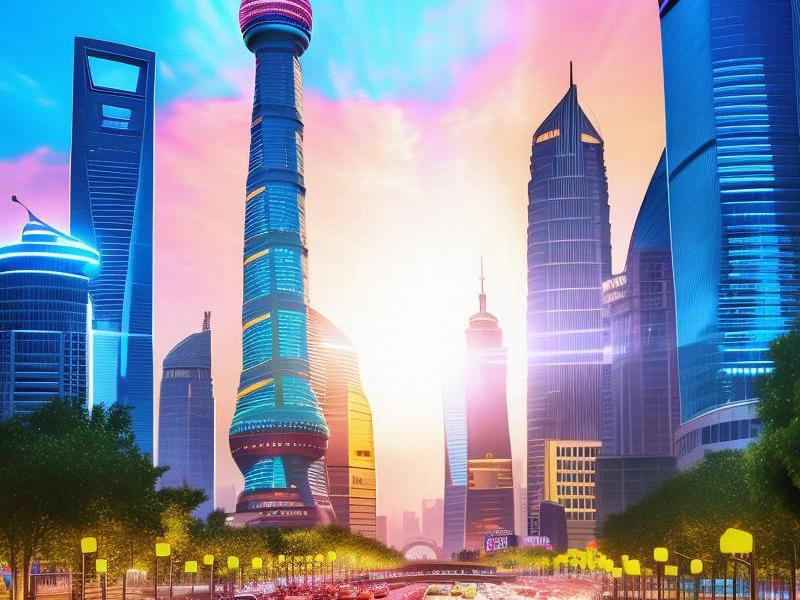This article delves into the vibrant and dynamic city of Shanghai, exploring its rapid urban development, economic prowess, cultural diversity, and the various ways it has transformed itself into a global metropolis. Shanghai today stands as a beacon of modernization and progress in China and the world.

Shanghai, often referred to as the "Pearl of the Orient," has long been a symbol of China's economic and cultural rise. Today, this bustling metropolis is not only the largest city in China but also one of the most important global financial centers. Its skyline, a blend of historic architecture and modern skyscrapers, is a testament to its rapid urban development and transformation over the past few decades.
The economic hub of Shanghai is unparalleled. As one of the four municipalities directly under the Central Government of China, it boasts the highest GDP among all Chinese cities. The city's strategic location at the mouth of the Yangtze River has made it a key player in international trade and commerce. Shanghai's port is the busiest container port in the world, handling millions of tons of cargo annually. This has positioned the city as a vital link between China and the global economy.
The financial district of Lujiazui is a symbol of Shanghai's economic might. Home to some of the world's tallest buildings, including the iconic Oriental Pearl Tower and the Shanghai Tower, this area is a hub for multinational corporations, banks, and financial institutions. The stock exchange in Shanghai is one of the largest in Asia, reflecting the city's importance in global finance.
However, Shanghai's story is not just about economics. It is also a city of rich cultural heritage and diversity. The Bund, a historic waterfront area, showcases a blend of colonial architecture and modern skyscrapers, offering a glimpse into the city's past. The Yu Garden, a classical Chinese garden, provides a serene escape from the urban hustle and bustle, reflecting the city's deep-rooted cultural traditions.
爱上海最新论坛
Shanghai's cultural scene is vibrant and multifaceted. The city is home to numerous museums, art galleries, theaters, and music venues. The Shanghai Museum, renowned for its extensive collection of Chinese art, attracts millions of visitors each year. The city also hosts international cultural festivals, such as the Shanghai International Film Festival and the Shanghai World Expo, which showcase its commitment to cultural exchange and innovation.
The culinary scene in Shanghai is another highlight. The city is famous for its distinctive cuisine, known as "Shanghainese cuisine," which features delicate flavors and intricate cooking techniques. Dishes such as Xiaolongbao (soup dumplings), Shengjianbao (pan-fried dumplings), and Nanxiang Mantou (steamed buns) are must-tries for food enthusiasts. The city's night markets and bustling food streets offer a diverse range of culinary experiences, reflecting the city's cosmopolitan nature.
Shanghai's rapid urban development has not been without challenges. The city has faced issues such as traffic congestion, air pollution, and housing shortages. However, the government has implemented various measures to address these challenges. The expansion of public transportation, including the metro system and bus rapid transit, has helped alleviate traffic congestion. Efforts to improve air quality through stricter environmental regulations and the promotion of green energy have also shown positive results.
上海水磨外卖工作室
The city's housing policies aim to provide affordable housing options for its residents while maintaining the high standards of urban living. The development of new residential areas and the renovation of old neighborhoods are part of these efforts. Shanghai continues to balance its rapid growth with the need to preserve its cultural heritage and improve the quality of life for its residents.
Shanghai's transformation into a global metropolis is also reflected in its role as a center for innovation and technology. The city has invested heavily in research and development, particularly in fields such as artificial intelligence, biotechnology, and information technology. The Zhangjiang Hi-Tech Park, one of the largest technology parks in China, houses numerous high-tech companies and research institutions. This has positioned Shanghai as a key player in the global technology landscape.
The city's education system is another area of strength. Shanghai is home to some of the best universities in China, including Fudan University and Tongji University. These institutions attract students and researchers from around the world, contributing to the city's intellectual capital and innovation ecosystem.
上海娱乐
Shanghai's international connectivity has also grown significantly. The city is a major hub for air travel, with two major international airports, Hongqiao International Airport and Pudong International Airport, serving millions of passengers annually. The expansion of high-speed rail networks has further enhanced Shanghai's connectivity with other major cities in China and beyond.
The city's role in global governance and diplomacy is also noteworthy. As a member of the World Trade Organization and a host city for numerous international organizations, Shanghai plays a crucial role in promoting global cooperation and addressing global challenges. The city's leadership in areas such as sustainable development, climate change, and urbanization reflects its commitment to making a positive impact on the world.
In conclusion, Shanghai today is a dynamic and multifaceted metropolis that embodies the spirit of modernization and progress. Its rapid urban development, economic prowess, cultural diversity, and commitment to innovation make it a global leader in various fields. While the city faces challenges, its resilience and adaptability ensure its continued growth and success. Shanghai stands as a shining example of what is possible when tradition and modernity coexist, creating a city that is both rooted in its history and forward-looking in its vision.
As Shanghai continues to evolve, it remains a symbol of China's rise and a beacon of hope for a more interconnected and prosperous world. The city's story is one of transformation, innovation, and resilience, offering valuable lessons for other cities around the globe.